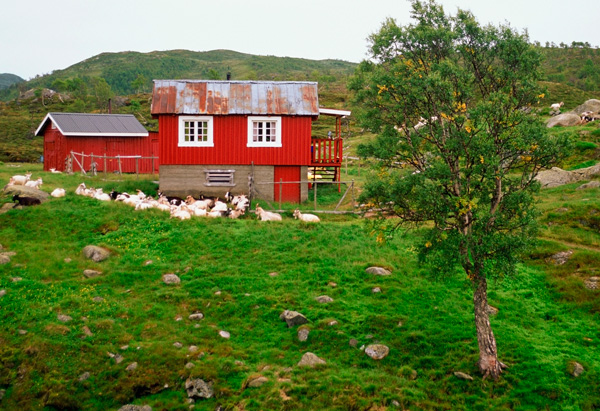Take the Leap: Why Change is Good
Meghan Daum risks her heart and home with mixed results.

Photo: Thinkstock
Last summer, I did something that made a lot of people think I was crazy. I moved out of my spacious, comfortable house in a small city and rented a tiny, drafty farmhouse several miles from town. Unlike my previous residence, which had a large office, central air-conditioning, and a guy who showed up to rake the leaves in the fall and shovel the snow in the winter, the farmhouse was like a homesteader's shanty. A one-story, 800-square-foot affair, it seemed to face the natural elements—the blinding prairie snowdrifts, the merciless high plains winds—like a submissive dog; it just crouched on its hind legs and relinquished all authority.
Which is sort of what I did, too. Unlike my old house, where I could eat dinner at 10 P.M. and talk on the phone all night, the farm was a joint venture. I moved here with my boyfriend, Henry, a man with no more disposable income than me (which is to say, none), a penchant for adopting unusual animals, and three exuberant boys whose hobbies include shooting pellet guns.
I made this move because I'd wanted to live on a farm my whole life. As much as I liked the solitude and space of my house in town, I'd spent nearly every Sunday since I'd been there scouring the classifieds for a farm where Henry and I could keep animals, watch the sun set, and stretch a clothesline between two cottonwood trees. When we finally found our farm, it was perfect in every way except for the house, which, with its two small bedrooms, was about five rooms short of ideal. Since I work at home and Henry's boys visit regularly, I could see we were in for an adjustment. As we moved in, the 10-by-12-foot room that would be my office spilled over with not only my desk, books, and files but also with sleeping bags and pillows for Henry's boys. To my dismay, I learned that the phone wiring wouldn't support an additional fax line. I could feel my independence slipping through my fingers. For the first time in my life, I suffered from insomnia.
When I took a chance and moved to this farm, I understood full well that I was trading autonomy and privacy for cramped quarters, extra responsibilities, and bills from places like the farm insurance bureau. It hardly surprised me that the first few months strained my relationship with Henry, not to mention my professional life and our finances. Nor was I surprised when hints of progress—we adopted two puppies, we hosted a successful Christmas party—always seemed to be followed by more small crises. The oven broke. The refrigerator broke. The puppies fought with each other, and, through agony and tears, I had to give one of them away. It was as if the farm were a needy child, a dependent that was constantly tugging at my skirt. But though there were days when I scanned the classified ads for houses back in town, I told myself to stick it out. The decision to try out this lifestyle was my own, and I owed it to myself to see where it would take me.
Which is sort of what I did, too. Unlike my old house, where I could eat dinner at 10 P.M. and talk on the phone all night, the farm was a joint venture. I moved here with my boyfriend, Henry, a man with no more disposable income than me (which is to say, none), a penchant for adopting unusual animals, and three exuberant boys whose hobbies include shooting pellet guns.
I made this move because I'd wanted to live on a farm my whole life. As much as I liked the solitude and space of my house in town, I'd spent nearly every Sunday since I'd been there scouring the classifieds for a farm where Henry and I could keep animals, watch the sun set, and stretch a clothesline between two cottonwood trees. When we finally found our farm, it was perfect in every way except for the house, which, with its two small bedrooms, was about five rooms short of ideal. Since I work at home and Henry's boys visit regularly, I could see we were in for an adjustment. As we moved in, the 10-by-12-foot room that would be my office spilled over with not only my desk, books, and files but also with sleeping bags and pillows for Henry's boys. To my dismay, I learned that the phone wiring wouldn't support an additional fax line. I could feel my independence slipping through my fingers. For the first time in my life, I suffered from insomnia.
When I took a chance and moved to this farm, I understood full well that I was trading autonomy and privacy for cramped quarters, extra responsibilities, and bills from places like the farm insurance bureau. It hardly surprised me that the first few months strained my relationship with Henry, not to mention my professional life and our finances. Nor was I surprised when hints of progress—we adopted two puppies, we hosted a successful Christmas party—always seemed to be followed by more small crises. The oven broke. The refrigerator broke. The puppies fought with each other, and, through agony and tears, I had to give one of them away. It was as if the farm were a needy child, a dependent that was constantly tugging at my skirt. But though there were days when I scanned the classified ads for houses back in town, I told myself to stick it out. The decision to try out this lifestyle was my own, and I owed it to myself to see where it would take me.



